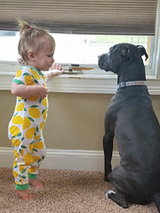Baby's Best Friend: Adriana's Hyperinsulinism Story
Baby's Best Friend: Adriana's Hyperinsulinism Story
Adriana Palmieri may owe her bright future to her dog, Watson.
After a smooth New Year’s Eve birth, Adriana went home with mom Jenna and dad, Sal, a day later. But on the third day, she wasn’t interested in eating, was lethargic and “her skin had a gray tinge,” Jenna remembers. “It was past midnight, we were all up and she was in her swing. As first-time parents, we weren’t sure what to do. We felt something was off, but thought we’d just wait to take her to her first pediatrician’s appointment in the morning.”

That’s when Watson took action. The 4-year-old pit bull-mix rescue went to Adriana and started barking. They tried to shush him, but he wouldn’t stop. “It was as if he sensed something,” Jenna says.
They immediately took Adriana to the local emergency room, where her sugar level came back under 10 (normal is at least 60 for a 2-day-old baby.). Recognizing the danger of seizures, clinicians immediately began finger-feeding her sugar and transported her to Monmouth Medical Center, which has a pediatric intensive care unit. There, an endocrinologist, Mike Barrows, DO, suspected Adriana may have congenital hyperinsulinism (HI) and put her on diazoxide, the front-line medication to combat hypoglycemia, or low blood sugar.
Rare disease, uncommon expertise
“We’re grateful that he was aware of HI, since it’s so rare — only 1 baby in 50,000 have it — and he knew about the resources at Children’s Hospital of Philadelphia,” Jenna says. “When her sugar levels were up and down on the diazoxide, he made the call to transfer her to CHOP.”
The Congenital Hyperinsulinism Center at CHOP treats more children with HI than any other hospital in the country. That expertise was apparent the minute the Palmieris arrived. “They put us at ease right away,” Jenna says. “Everyone there, from the transport team to the nurses to the endocrinologists, is at the top of their game.”
Genetic testing confirmed hyperinsulinism and pointed to a diagnosis of focal disease for Adriana, meaning she could be cured with surgery. In preparation, she underwent an 18F-DOPA PET scan. This test is used to determine which area in the pancreas contains the malfunctioning beta cells because they usually light up. “But nothing really showed up,” Sal says. “There was no road map pointing to which part of her pancreas to remove.”
CHOP’s expertise comes through again
Surgeon-in-Chief N. Scott Adzick, MD, MMM, has performed more than 500 pancreatectomies and has been in this position before. During Adriana’s surgery, he saw an area of her pancreas that didn’t look quite right. He removed a 2 mm lesion — that’s smaller than one-tenth of an inch — and enough surrounding tissue to ensure he got it all.
Gifted surgeon
“Dr. Adzick met with us right after the surgery and told us that he saw something funny looking,” Jenna says. “But it was more than that. He has a gift for this. He’s amazing.” Adzick had, indeed, excised the entire lesion. Adriana stopped having low blood sugar almost immediately, and she passed her 24-hour “cure fast” easily.
“To go from this being a huge problem to being cured is something I still have a hard time wrapping my head around,” Jenna says. “I give the HI Center all the credit. Every nurse, every doctor knew exactly what to do and how to explain things to us so we could understand. We had the best-case scenario.”

Even though there was no evidence Adriana had any seizures before she was treated for extremely low blood sugar, HI Center clinicians still recommended the Palmieris follow up with Developmental and Behavioral Pediatrics at CHOP to be sure there was no lasting damage. “Her evaluations show she’s on track for everything,” Jenna says. “She a happy, fun kid who brings a smile to everyone when she walks into a room.”
Adriana, now 2 ½, loves music, dancing, Peppa Pig, going to the beach and her cousins. And, of course, her dog, Watson.